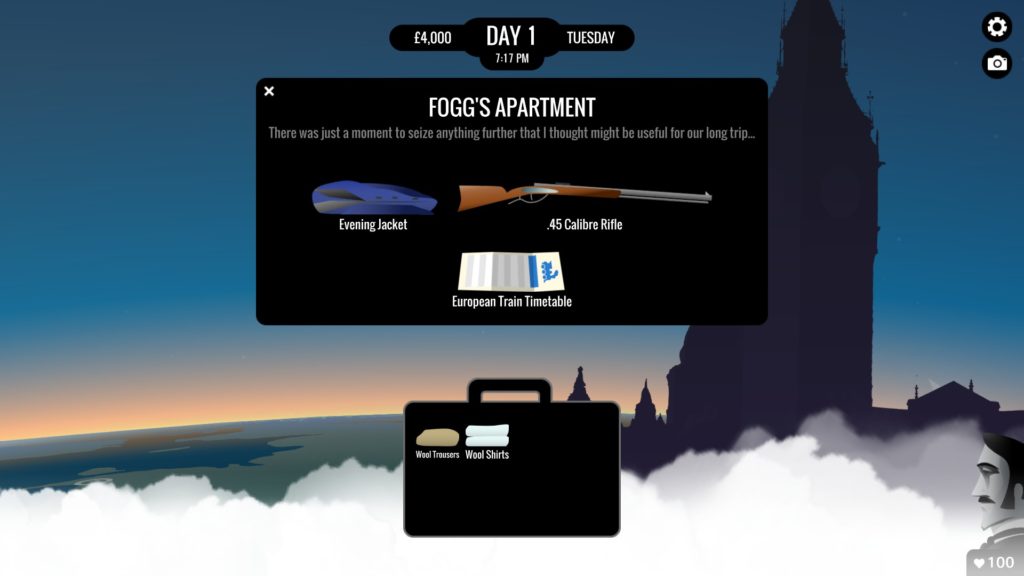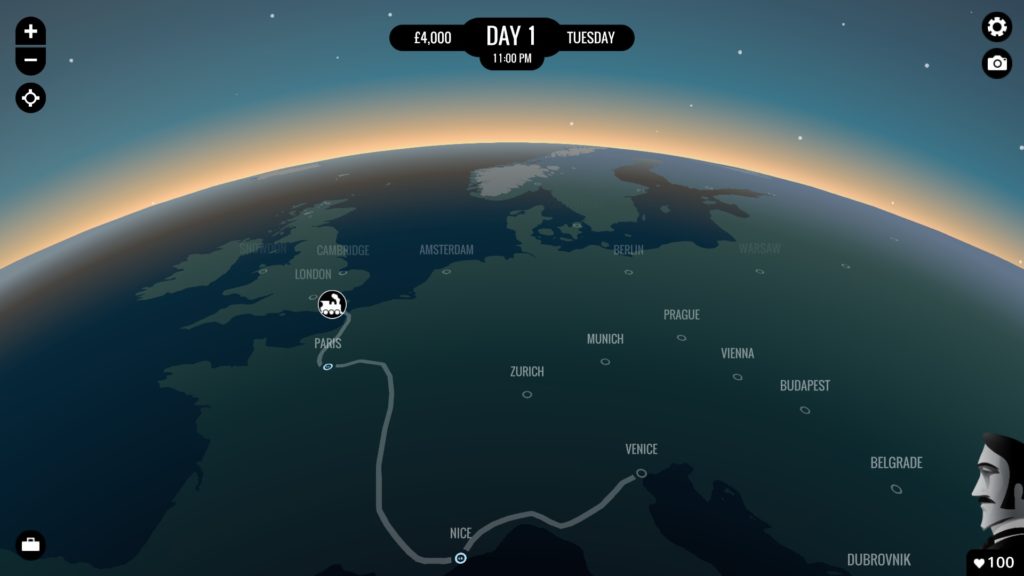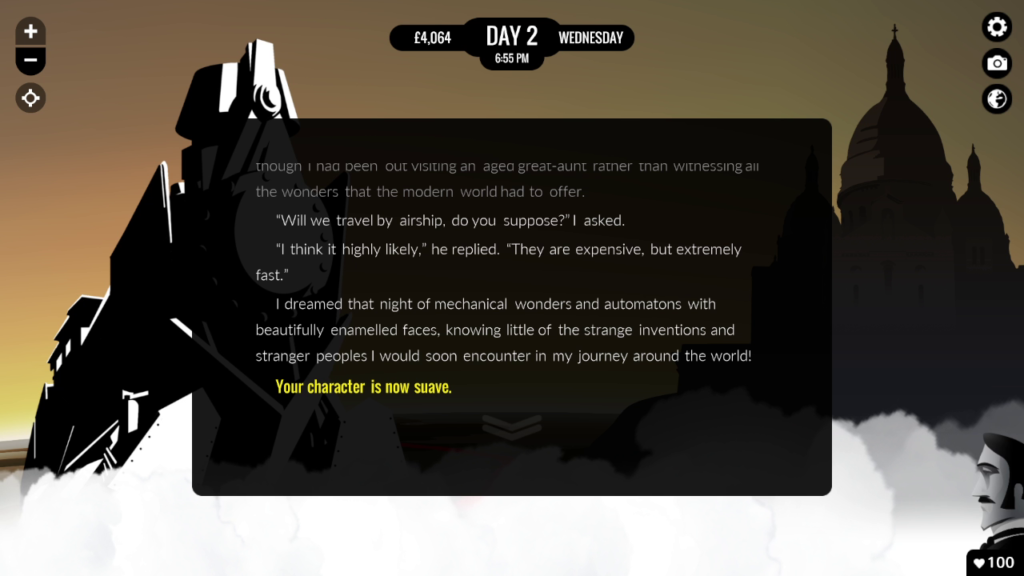Mentor Game Details
80 Days is a work of interactive fiction inspired by Jules Verne’s classic novel, Around the World in 80 Days. Phileas Fogg, an archetypal (if eccentric) English gentleman, takes on a wager to circumnavigate the globe within eighty days, bringing his French valet, Jean Passepartout, along for the ride. The game is set in an alternate, decentralized take on the late nineteenth century. In its setting, dubbed Victorian Futurism by scriptwriter Meg Jayanth, the development of clockwork automata throughout Africa and Asia has reshaped the technical landscape and diminished the impact of European colonialism (Jayanth, 2014). This change, compounded by the player’s choices as Passepartout and the semi-random nature of the medium, leads 80 Days on a wholly distinct narrative path from its novel inspiration.
The game’s developer, inkle, has a history of developing not only interactive fiction but the tools used to create it. Before 80 Days, the studio developed an interactive adaptation of Frankenstein; the first iteration of its interactive fiction tool, inklewriter; and a game for learning poetry made for Penguin Group (USA), among other projects. The press kit and blog posts leading up to the game’s release reveal nothing about either a target audience or educational intent, though its more recent release on the Nintendo Switch carries an E10+ rating—not dissimilar to the expected age range for the original novel.

Gameplay is heavy on menus and text, with branches based on player decisions. The clock constantly advances outside of lengthy text blocks—primarily those resulting from the “explore” option in cities—imposing urgency on the player’s choices. Depending on the city, they may have access to a market where they can exchange goods and a bank where they can make a withdrawal from Fogg’s reserves if their funds are running low. The foremost challenge comes from the balancing act of rapid progress and sustainable funds, which becomes easier if the player is savvy about the goods they ferry from city to city.
As the goal is to travel around the world, each destination is ultimately a step towards the next. Every city has numerous routes in and out, which the player learns about through exploration, chats with other characters, or regional transit schedules from markets. For each journey, there is a cost, departure and travel times, and potential repercussions such as limited luggage space or adverse effects on Fogg’s health—a source of further delays if not carefully managed. During travel and exploration, the player can speak to Fogg or other passengers. Through these conversations, they discover new routes, valuable goods to take to or from specific cities, and side objectives which may in turn lead to further discoveries.

Outside of cities, a distant view of the globe emphasizes the player’s location and available routes. 80 Days was not designed as an educational game and has no supporting materials, but this map is its greatest curricular artifact. Though routes are not strictly factual, there is no fiction to the cities’ locations, and visual design reflects the unique culture of each.
Gameplay Experience
I have completed a single journey across a pair of gameplay sessions. If the achievements integrated into Steam are any indication, I achieved very little beyond a successful journey—I visited the World’s Fair in Paris and made at least 20 stops on my way back to London—but I learned enough about the mechanics, gameplay, and connected world to fare better in the future. As the core focus is not on education, I hesitate to suggest any drastic alterations. However, appending countries to the names of cities would strengthen the built-in geography lesson, with careful mind to changing borders.
Principles of Learning
Co-design and identity—direct influence over the game, and personal stakes through it—are fundamental to 80 Days. Every decision the player makes, whether discrete choices in dialogue or diverse gameplay actions, impacts the available routes to eventual conclusions. The player’s actions also shape the person Passepartout becomes, which further alters the story.

Skill under strategy—the use of complex strategies to solve problems rather than isolated skills—is a deeper cog in the underlying mechanics. Items in markets are labelled with sets they belong to, the types of people they might appeal to, or the locations where they are particularly valuable. Traveling through harsh climates is more bearable with the right gear, A deck of cards may keep a tight-lipped passenger talking about connections and goods, and wine from Paris may fetch a pretty penny halfway across the globe. Each of these has a natural place in moving the player’s journey along; strategically aligning travel routes with the right items makes efficient use of inventory space to keep health and funding high, which saves time over hoarding or wandering. This feeds into system thinking, a principle of deep understanding. By evaluating each type of item and its associated opportunities, the player can turn the interlocked components in their favor—not unlike the clockwork automata so prominent in the setting.
For all the things 80 Days does exceptionally well, it needs improvement in its cycle of expertise. This principle, a continual movement from challenge to practice to mastery to new challenges which prior knowledge cannot address, is largely absent at the level of a single playthrough. Instead of these low-level challenges, each individual run can be seen as a single challenge, with the player’s decisions forming practice into possible mastery and the procedural variations of future runs as subsequent challenges. This works—it is, in fact, the foundation of the entire roguelike genre. However, as is often the case in this genre, it can leave the player floundering during a single run. Some of this is by design; there is no guaranteed period in a temperate climate to develop negotiation and trading skills before adding the wrinkle of hazardous climates. However, the developers could have imposed more limits on early transit to enforce such a learning process before they reach the wider world.
Player Type
Of Caillois’ Patterns of Play, the only one prominent in 80 Days is Mimicary. This is a work of interactive fiction which thrives when the player adopts the role of protagonist and wraps themselves in the narrative. Other patterns are present in minor areas—notably Alea through procedural elements—but none define the game so much as Mimicary.
80 Days is designed to appeal to those interested in a compelling story—players seeking action-packed combat will need to look elsewhere. Bartle’s socializer and explorer archetypes, however, will be right at home. Though there is no direct interaction between human players, much of the narrative is shaped by how the sole player interacts with the other characters they encounter, including aspects of the protagonist which evolve throughout the game. For explorers, the interconnected world map is incentive enough; numerous connections and endings are accessible only by digging deep into specific opportunities. Achievers get a special mention: the routes taken by other players display in real time, which would have been more meaningful closer to the game’s 2014 launch (Multiplayer Interactive Fiction, 2014).
Bibliography
inkle blog—Multiplayer Interactive Fiction. (2014, May 26). Inkle Blog. https://www.inklestudios.com/2014/05/26/multiplayer_if.html
Jayanth, M. (2014, May 8). inkle blog—Verne and Victorian Futurism. Inkle Blog. https://www.inklestudios.com/2014/05/08/victorian-futurism.html
